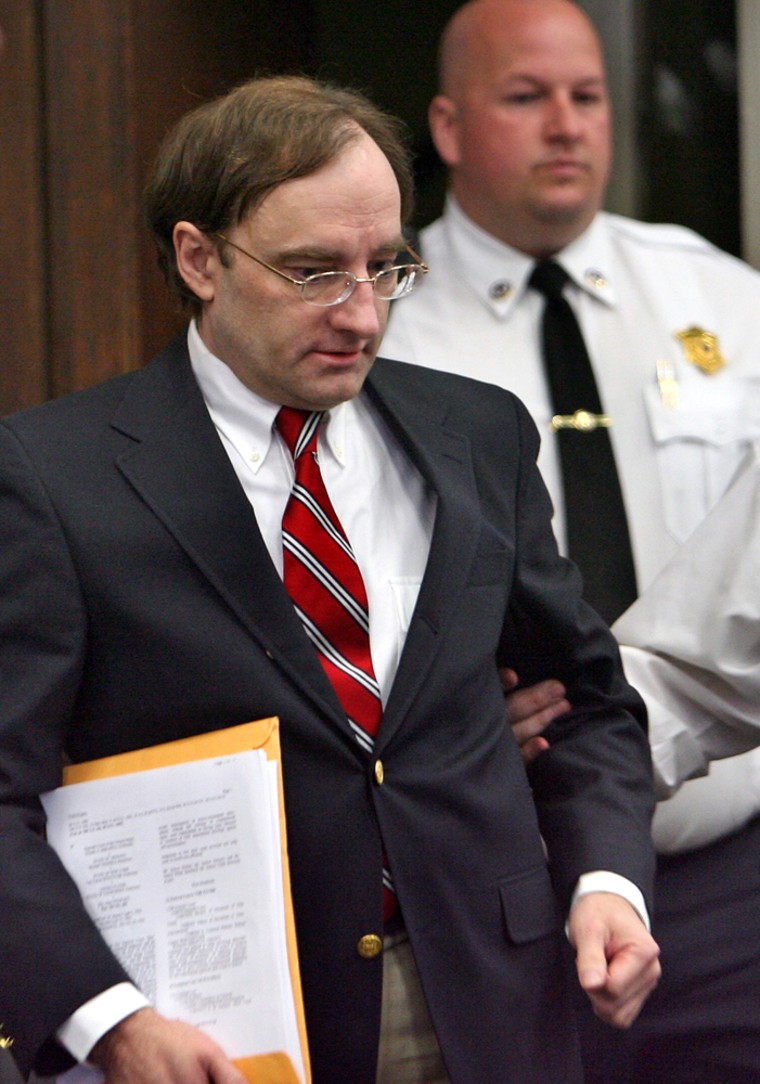The man who calls himself Clark Rockefeller won a court fight to keep jurors from hearing most of his four-hour interrogation after a judge ruled that investigators persisted even though he had invoked his right to remain silent.
Rockefeller, a German national whose real name is Christian Karl Gerhartsreiter, is charged with kidnapping his 7-year-old daughter during a supervised visit in July in Boston, sparking an international manhunt. He was found with the unharmed girl in Baltimore six days later.
He claimed he told investigators 14 minutes into the interrogation the day he was found that he didn't want to talk.
Suffolk Superior Court Judge Frank Gaziano agreed in a ruling made public Monday that Gerhartsreiter had "clearly and unequivocally" invoked his right to remain silent, but that investigators continued to interrogate him.
Gerhartsreiter, 48, is slated to go on trial next month. Authorities say he used aliases after moving to the United States in the late 1970s, and he has been called "a person of interest" in the 1980s disappearance of Jonathan and Linda Sohus, a couple from San Marino, Calif.
Gerhartsreiter, 48, is to go on trial next month. Authorities say he used aliases after moving to the United States in the late 1970s to work his way into wealthy circles in Boston, New York and Los Angeles.
After his arrest in the kidnapping case, California authorities called him a "person of interest" in the 1980s disappearance of a San Marino couple, Jonathan and Linda Sohus.
'I just want to be a father'
Gerhartsreiter's lawyers say he told investigators at the beginning of the interrogation that he was willing to speak to them "within a limited extent." He said he was distraught over his daughter and how he had lost custody of the girl to his ex-wife seven months earlier.
"I just want to be a father — I've been a father — sole caretaker for six-and-a-half years and she was taken from me ... she was taken from me four days before Christmas which was evil," Gerhartsreiter said in the first moments of the interrogation, according to excerpts included in the motion.
Gerhartsreiter's lawyers say he told investigators he did not want to talk anymore after the FBI agent told him it was a crime to lie to a federal law enforcement agent.
"Uh, in that case I better not say anything because I don't want to be accused of lying later, so..." Gerhartsreiter said.
Gerhartsreiter's lawyers said that he repeated his desire not to talk, but that investigators resumed questioning him a short time later.
"He invoked his right to remain silent, and that right was not scrupulously honored," his attorney, Jeffrey Denner, said Monday.
Jake Wark, a spokesman for Suffolk District Attorney Dan Conley, declined to comment on the impact of the ruling on the prosecution's case.
"We're quite ready to go to trial," he said.
'Evasive' answers
In his ruling, Gaziano said that during the initial moments of the interrogation, Gerhartsreiter told investigators "that he committed (the) crime in order to resume his role as a father to his child."
"I just want to be with her ... I want to get her up in the morning, send her off to school, walk her to the bus," he said, according to excerpts cited by the judge in his ruling.
The judge said Gerhartsreiter gave "evasive and incomplete" answers to simple questions about his life during the first part of the interrogation.
He said he was born in New York, but then said he was "not totally clear. It could have actually been Boston."
"It was apparent that Gerhartsreiter was not being candid with the police officers and had little regard for the truth," Gaziano wrote in his ruling.
It was at that point that investigators told him it was a crime to lie to a federal law enforcement officer.
Neither prosecutors nor Gerhartsreiter's defense attorneys have disclosed what he said during the rest of the interrogation, after he told investigators he didn't want to talk. Under Gaziano's ruling, everything he said after that point will not be heard by the jury.
In a separate ruling made public Monday, Gaziano refused to drop a false-name charge against Gerhartsreiter.
His lawyers argued that Gerhartsreiter had used the Rockefeller name for at least 15 years and was not trying to deceive authorities when he gave that name after his arrest.
But Gaziano found that the grand jury that indicted Gerhartsreiter heard enough evidence to show probable cause that he failed to identify himself by his given name "for the dishonest purpose of avoiding possible deportation."
More on:
